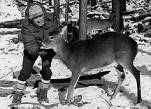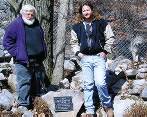
The passing of Joe Taylor recently, brings to mind the mortality of us all, but more importantly, it marks the disappearance of a whole breed of outdoorsmen and their way of life that were personified by Joe Taylor, Ralph Space, and their buddies living around here. And by "here" I'm referring to the corner of our earth that was a rural, semi-wilderness at the beginning of the last century (or this century, depending on how you look at it). "Here" is northwestern New Jersey.
Joe Taylor was born in 1908, and spent his childhood in Washington in an area that in those days was not heavily settled. At an early age he learned about animal trapping and hunting, and some fishing too, that put food on the family table. In addition, trapping provided some cash income from the pelts of foxes and other animals in the fall season when such furs were their richest. Occasionally, he would inadvertently trap a skunk and his school-master would reject his attendance and send him home to scrub himself and change clothes. His mother, who was his early trapping companion, died when he was still a child and his father's second choice produced a step-mother who felt the boy needed a lot more discipline.

Little Joe had a different solution; while still in his early teens he built himself a one-room log cabin on a friend's farm on Warren County's Montana Mountain and at the age of sixteen he moved in. He lived there, by himself, until he was 25 years of age. His cabin was a well-constructed home; after 75 years it is still there.
His years as a young teenager were not spent in school. He worked for a number of years at the Edison Cement Plant in New Village, at first as a "Sample Boy", and later at the Washington Hosiery Mill. He got in the habit of taking time off from the job each fall to spend a couple of months trapping in New York State on the Canadian border. This became a fine source of income, a good bit more than he was getting from the Edison plant. His boss didn't like the idea and threatened to fire him... but never did. In the early 1920s, Joe Taylor and Ralph Space of Sussex County met for the first time, "while out hunting snakes." Both young boys became close friends, more like brothers, people said, who kept in touch with each other for the rest of their lives, although they lived in different counties. Both were outdoorsmen who spent a lot of their lives trapping, hunting, and taking city folk on Delaware River fishing excursions.

During the early 1920s, too, Ralph Space created and operated a successful bootlegging business; he owned several small stills scattered around the county. At about this time he helped establish the area's first volunteer fire company and used its fire truck to deliver the illegal liquor. Authorities never suspected that the town's fire engine was a bootlegger's vehicle. A photo of this fine fire truck, to this day, hangs in the Space Farm business office. During the late 1920s, Ralph Space went to work for the High Point State Park where deer were just beginning to appear. Ralph's job was to protect the deer from bobcats, foxes and other animals that would kill a deer, and he was permitted to trap these killers. He sold their hides on the open market and kept this money for himself.
In the 1930s, Ralph went to work for the New Jersey Fish and Game Commission. He stocked trout in the streams in the area using a rowboat, wooden at first and then aluminum. Most stocking was done in early spring when the water was high and still bitter cold. Ralph experienced several dunkings in the streams caused by high water, or ice chunks, or getting hooked on barbed wire that farmers stretched across the river to keep their cows confined. Also, Ralph trapped beavers and moved them to mountain areas to prevent them from damming rivers and causing floods on roads and farm land.
Here again, however, the principal job was to control the foxes, bobcats, bears, any animal that was a threat to deer. Ralph was permitted to kill the deer's enemies (the four-legged ones) and sell the skins. The animal furs, especially those that went into lady's fur coats, provided good extra money for Ralph. The only problem was that fur quality didn't become acceptable until the fall season approached, when mother nature made the furs heavy and rich. Ralph decided to keep his captive animals alive until that time of year when the hides brought top dollar. And it wasn't only red foxes, but also gray foxes, bobcats, skunks, raccoons, possums. Unfortunately, during the summer the Space children fell in love with the animals. They gave them names and made them family pets. When fall came and Ralph prepared to kill what had now become new family members the kids objected and cried loudly. The animals remained alive and the Space Farms Zoo and Museum came into existence to keep them. The zoo and game farm are still there and draw large crowds in season.

Later, after the kids had local pets to play with, Ralph imported Canadian silver foxes and mink, raised them and sold their hides. One year he sold 400 fox hides and 22,000 mink hides. For a while this was a profitable business until the prices dropped; then Ralph got into other things. With the coming of World War II and our entrance into it in 1941, life changed for Joe Taylor. His friend Ralph was just 40 years of age and therefore too old for the army, but Joe was young enough, at age 32, to serve his country and he enlisted. He applied for service with the Ski Troops but was turned down. His first dangerous mission was to go to a recently opened training camp down south and clean out the hundreds of rattlesnakes that were found there. He did the job with full military efficiency.
Early in his military career Joe had to fill out a form that required he list, among other things, his civilian occupations. He wrote that his only occupations were "Hunting and Fishing". When this information reached the top brass at the base in New England, the commanding general ordered him into his office for further questioning. Joe insisted that hunting and fishing had been his life's work and the general asked him if he liked to hunt ducks; Joe answered with a strong affirmative. He told the general about his fine hunting dog and his first-rate duck-hunting boat but stated that, unfortunately, they were in New Jersey. The general gave Joe a three-day pass and the young soldier went home and picked up dog and boat. From then on Joe accompanied his general on hunting trips as his guide and even when the unit went to Europe Joe and his general kept up their duck hunting activities. Joe and his general remained good friends even with the coming of peace and the men and their wives got together whenever possible. They stayed in close contact until the general's death. After he returned from World War II, Joe married a pretty young thing with the interesting name of Aimee Morris. They began raising a family; four sons were the final result. At this time Joe also started his career with the New Jersey Fish and Game Commission.

And now with the security of a government job, Joe purchased a fine piece of property on the Delaware River just upriver from the Columbia covered bridge. He would have been happy here for the rest of his life but shortly, in the 1950s, the government began buying up land in this region for the extension of Route 46 and Route 80. And in 1955 the worst flood in the history of the Delaware River hit this section particularly hard. Much damage was done and many lives were lost. The fine old covered bridge that crossed the Delaware at Columbia, near the Taylor property, was swept away.
As an alternative home base, Joe purchased 130 acres of woodland on Mt. Pleasant Road in Knowlton Township, high above the Delaware. In the next few years, he purchased additional land adjoining his first piece until he owned a piece totaling 380 acres in this wooded area. He dug two good-sized ponds on his property and, in 1963, the Taylor family moved to the Mt. Pleasant Road property. It was in 1965 that Joe, still an employee of the Fish and Game Commission, live-trapped the first coyote ever seen in New Jersey. With the family's move, Camp Taylor Campground came into existence. The Camp's acreage backed up to the Worthington State Forest, and still does, which contains over 6000 wild acres along the Delaware. And passing through Worthington State Forest near Camp Taylor is the Appalachian Trail which is at about the halfway mark on the Trail's 2000-mile hike between Maine and Georgia.

The most recent addition to Camp Taylor was the establishment, in June of 1998, of the Lakota Wolf Preserve on ten acres of the campground. Here a full pack of Arctic wolves, a pack of Timbers, and a pack of Tundras live in semi-wild conditions, as well as a fox or two and some bobcats. The prime mover in getting this unique wolf reservation into Camp Taylor was Len Rue III, a Warren County boy, lifelong friend of Joe, Ralph, and their sons, and now one of the outstanding natural photographers in the world. Rue's long friendship with Lakota's proprietor, Dan Bacon, another of New Jersey's finest wildlife photographers, has greatly enhanced the options for visitors to the Delaware Water Gap area. The Wolf Preserve is now open to the public.
By this time both Joe and his friend, Ralph, seemed to have settled down in security. Both were parents and then grandparents. Soon their children--Joe's son, Clayton and Ralph's son, Fred--were running their father's individual businesses. And before long, Fred's son, Parker, would be manager and operator of the Space enterprise and Fred would be retired. Old age was, indeed, overtaking the two outdoorsmen of yesteryear but even in the final years their closeness remained.

Ralph's children called their father's friend "Uncle Joe"; their own father was "Gramps". Ralph's son, Fred, who ran the Space Farm for a number of years became particularly close to "Uncle" Joe. He had this to say: "I would consider Joe as my second Dad, my second Father. Sometimes I would confide in him rather than my father about serious personal problems." In 1986, Ralph Space passed away at the age of 84. He had been in the hospital a few days but insisted he was cured of whatever ailed him; he came home. Two days later, while outside, driving a cart in the yard, he suddenly collapsed and died. He was probably content. He had always proclaimed: "I don't want to die in bed...unless its with a young woman." He got his way. Joe Taylor, the younger member of the duet, lived until the fall of 1999. Although he missed his old friend, his health seemed fine until his last year, at age 90. Joe passed away at home at age 91 and saw most of his living friends before his death. The funeral service was as crowded as Ralph's had been, maybe more so. Of course, all the Space family members were present. Ralph's son, Fred, now retired, asked permission to say a few words: "My Dad and Joe met on the trap line a year before I was born. They've been like brothers ever since. When I was an infant my first word was "Mama", my second word was "Dada". My third and fourth words were "Joe Taylor" These were the most important people in my life."